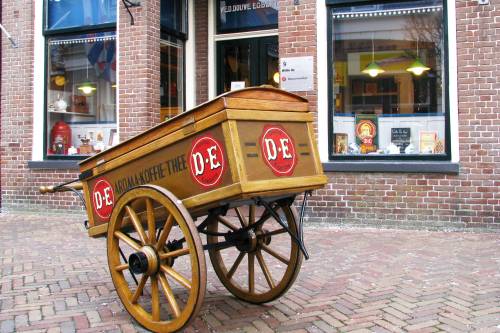Het is de Maand van de Geschiedenis! Het thema dit jaar is geluk. Daarom kijken we deze maand met een roze bril naar onze collectiestukken en vragen we ons af: maakten ze mensen gelukkig? Deze keer kijken we naar de geschiedenis van Douwe Egberts. Douwe Egberts brengt gezelligheid en genot en maakt daarmee al jaren mensen gelukkig, zou je zeggen. Maar is dat ook zo, en hoe is dat kleine winkeltje in Joure eigenlijk uitgegroeid tot een wereldwijd begrip? Reis mee door de tijd!
“En toen was er koffie…”
Zonder de koffieplant zou Douwe Egberts niet bestaan hebben. Daarom beginnen we bij de ontdekking hiervan. Er gaan veel mythes rond over de ontdekking van koffie maar de oudste is het verhaal over een geitenhoeder. De geitenhoeder trok met zijn kudde door het huidige Ethiopië. Hij merkte dat zijn geiten zich drukker gedroegen na het eten van een bes. De geitenhoeder probeerde de bes zelf en ook hij kreeg er veel energie van. Hij vertelde het aan monniken van een klooster in de buurt. Zij maakten er vervolgens een drankje van door de bessen eerst te branden en te koken. De eerste koffie was een feit.
Handel door de VOC
In de 11e eeuw werd de koffie vanuit Ethiopië naar Arabië geïmporteerd. Via handel met Italië bereikten de koffiebonen ook Europa. Toen de vraag naar koffie steeg, speelde de VOC daar op in. Omdat de handel met de handelspost Mokka de VOC te duur werd, besloot de compagnie eigen plantages op te zetten op Java. De koffieplanten groeiden goed en daarmee ook de Nederlandse koffiehandel.
Eerste winkel
In 1753 richtte Egbert Douwes samen met zijn vrouw Akke Thijssens een winkeltje op met koloniale waren. Aan de Midstraat in Joure verkochten zij onder andere koffie, thee en tabak. De zaken liepen goed maar Egbert Douwes hield het uitsluitend bij de verkoop vanuit zijn winkel aan de lokale bevolking. Zijn zoon Douwe Egberts bracht daar later verandering in.
Over een andere boeg
Douwe Egberts, de zoon van Egbert Douwes, ging in 1780 zijn vader helpen met de zaak. En na het overlijden van zijn vader nam hij de zaak over. Douwe Egberts pakte het anders aan. Hij was ambitieus en ging op bezoek bij zijn klanten. Eerst alleen in het zuiden van Friesland maar later ook in Overijsel en in Drenthe. Het merk Douwe Egberts werd zo ook buiten Friesland op de kaart gezet.
Familie De Jong
In 1806 overleed Douwe Egberts. Zijn tweede vrouw, Lysbeth Mintjes, nam het bedrijf over, waarna het Firma van de Weduwe Douwe Egberts ging heten. In 1811 was Napoleon aan de macht in Nederland. Hij verplichte iedereen een achternaam aan te nemen. Lysbeth Mintjes koos toen voor de achternaam De Jong.
Lysbeth Mintjes kwam te overlijden in 1833. De zonen van Douwe Egberts namen het bedrijf over. Hessel Douwes de Jong zette later het bedrijf voort onder de naam Firma Douwe Egbertszoon. Ook bleef hij in het woonhuis aan de Midstraat, dat hij in 1831 had aangekocht.
Tweede stichter
We maken een sprong in de tijd. Het is 1887 als Cornelis Johannes de Jong het bedrijf gaat leiden. Hij wordt gezien als de tweede stichter van Douwe Egberts. Dat komt doordat hij ervoor heeft gezorgd dat het bedrijf uitbreidde. In 1898 bouwde hij het eerste fabrieksgebouw in de achtertuin van zijn woonhuis aan de Midstraat. Inmiddels werden de waren in het winkeltje ‘De Witte Os’ verkocht, gelegen naast het woonhuis.
Grote brand
In 1881 gingen het woonhuis en het fabrieksgebouw verloren door een brand. Johannes Hessel besloot de gebouwen direct te herbouwen. Deze zijn nu onderdeel van Museum Joure.
“Gebrand voor Nederland”
Toen het fabrieksgebouw niet meer voldoende ruimte bood, kocht Cornelis Johannes de Jong in 1912 een groter fabriekspand aan de Zijlroede in Joure. Maar de expansie ging door. In 1919 kwam er ook een vestiging in Utrecht.
Einde familiebedrijf
Douwe Egberts bleef groeien. In 1937 werd het merk Pickwick geïntroduceerd, geïnspireerd op de ‘Pickwick Papers’ van Charles Dickens. Na 1945 kwamen er goederenfilialen door het hele land, maar ook in België, Frankrijk, Spanje en Denemarken. Door de aanhoudende groei kwamen er steeds meer niet-familieleden in de leiding van het bedrijf. Na de overname van het Amerikaanse Consolidated Foods Corporation in 1978 was D.E officieel geen familiebedrijf meer.
‘En dan is er koffie, Douwe Egberts koffie, lekkere koffie’
Inmiddels zijn we meer dan 260 jaar verder en is Douwe Egberts één van de grootste koffiemerken en Pickwick een begrip voor theeliefhebbers. Wist je trouwens dat Nederlanders de meeste koffie drinken van alle landen waar koffie wordt gedronken? Of het nou ‘s ochtends is om wakker te worden of gezellig samen met vrienden; we vinden altijd wel een moment om een lekker kopje koffie of thee te drinken.
Of we gelukkig worden van koffie en thee? Dat is een lastige. In elk geval kunnen we zeggen dat veel geluksmomenten gepaard gaan met één van beide, zo benadrukt ook de nieuwste commercial van Douwe Egberts.



